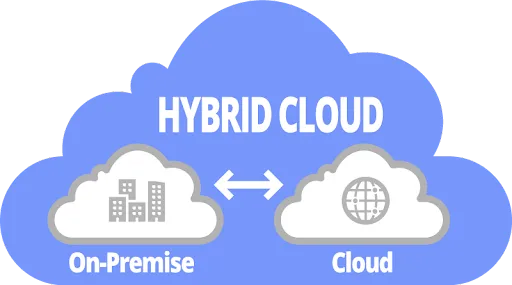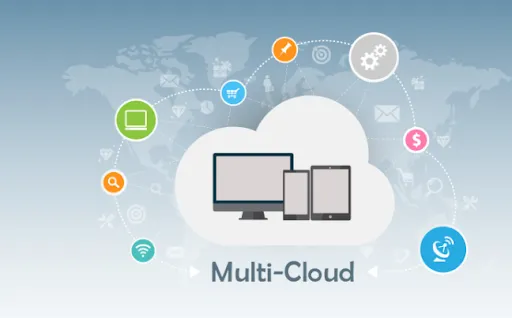Cloud Computing is one of the most critical aspects of the digital age. It has transformed the way we work and live. There are a few distinct types of Cloud Computing platforms, but two of the most popular are Hybrid Cloud and Multi-Cloud.
Moreover, there is a lot of talks these days about Multi Cloud vs Hybrid Cloud. But what are they, and what is the difference between them? In this blog post, we will analyze the differences between Hybrid Cloud and Multi-cloud and help you determine which alternative is right for your business.
What is Hybrid Cloud?
A Hybrid Cloud is a Cloud Computing environment that utilizes a mix of on-premises, private cloud, and third-party, public cloud services like Google Cloud. It allows organizations to use multiple Clouds from different providers as well as their own infrastructure.
Moreover, Hybrid Clouds provide organizations with more flexibility and agility. They can be used to extend an on-premises data center, consolidate multiple Clouds into a single environment, or use public cloud services for burst capacity or specific applications.
- By 2024, more than 90% of enterprises will rely on a Hybrid Cloud environment to meet their infrastructure requirements. (G2)
- In 2020, the worldwide Hybrid Cloud market was valued at $52 billion and predicted to reach $145 billion in 2026. (Statista)
Image Source: Statista
What is Multi-Cloud?
A Multi-Cloud strategy uses multiple public clouds like Amazon Web Services (AWS), Google Cloud Platform (GCP), and Microsoft (Azure), as well as one or more private clouds. It gives businesses greater control over their data and applications by allowing them to move workloads between Clouds.
Image Source: Veritis
Additionally, a Multi-Cloud strategy can help organizations avoid vendor lock-in. For example, if your business is using AWS for public cloud services, but you want to start using Google Cloud Platform for its analytics capabilities, you can use a Multi-Cloud strategy to connect the two environments.
But for this, I will suggest getting connected with AWS Cloud services provider and Google Cloud development partner company to get innovative Multi-Cloud solutions.
- 93% of enterprises have a Multi-Cloud strategy. (Flexera)
Pros and Cons of using Hybrid Cloud
The pros and cons of employing a Hybrid Cloud depend on your specific business needs and requirements. However, here view some of the key pros and cons of using Hybrid Cloud.
Pros
- Increased flexibility and choice of providers
- Improved performance and cost savings
- Easier to manage than multiple individual Clouds
- Better support for a remote workforce
- Increased agility and innovation
- Improved security and risk management
Cons
- More complex to set up and manage
- Security Concerns due to 3rd Party Involvement
- Potentially higher costs if not managed correctly
Pros and Cons of using Multi-Cloud
The pros and cons of Multi-Cloud may depend on the specific needs of your business. However, there are some general pros & cons to consider when deciding whether or not Multi-Cloud is right for you.
Pros
- Greater control over data and applications
- More capacity and geographical coverage
- Easier to switch between providers
- Network Performance Improvements
- Enhanced Risk Management
Cons
- Increased complexity
- Potentially higher costs if not managed correctly
Also Read: AWS vs Azure vs Google Cloud: Which Platform Is Best?
Multi Cloud vs Hybrid Cloud: Difference Between Hybrid Cloud and Multi-Cloud
There are a few key differences between Hybrid Clouds and Multi-Clouds.
The main distinction is that a Hybrid Cloud uses multiple clouds from different providers, while a Multi-Cloud strategy uses multiple public clouds. Additionally, a Hybrid Cloud can be used to extend an on-premises data center, while a Multi-Cloud strategy cannot.
A Hybrid Cloud is also more complex to set up and manage than a Multi-Cloud strategy. Security concerns are also a key difference, as Hybrid Clouds involve the use of third-party Clouds, whereas Multi-Clouds do not.
The final difference is that hybrids are typically more complex to set up and manage, while Multi-Clouds are often seen as being easier to manage. However, this may depend on the specific needs of your business.
If you are thinking of including Hybrid Cloud or Multi-Cloud, then get connected with the best Microsoft Azure development company, AWS cloud services provider, or Google cloud consulting company. By doing so, you will get suitable solutions for your business needs.
Also Read: Top 20 Cloud Services Companies For Enterprises To Connect With In 2022
Hybrid Cloud vs Multi Cloud: Similarities Between Hybrid Cloud and Multi-Cloud
Despite the fact that Hybrid Cloud and Multi-Cloud are two different types of Cloud Computing, there are some similarities between them. Both allow organizations to use multiple Clouds from different providers, as well as their own infrastructure.
They also give businesses more flexibility and options when it comes to sourcing and using Cloud services. This can lead to improved performance and reduced costs. Additionally, they are both ideal for businesses that need more capacity or geographical coverage.
Multi-Cloud vs Hybrid Cloud: Comparison Between Both Cloud Computing Platforms
The factors given below will help you know which Cloud strategy is best for your business –
1. Architecture
A Hybrid Cloud is a composition of two or more Clouds (community, private or public) that are connected to create a single unified environment. A Multi-Cloud architecture involves using multiple public clouds.
2. Inter-Cloud Workloads
Hybrid Clouds are ideal for workloads that need to be moved between private and public clouds. Multi-Cloud is better for workloads that need to be run in different environments or that are incompatible with the infrastructure of a single Cloud provider.
3. Data Sovereignty
A Hybrid Cloud gives businesses more control over their data as it is spread across multiple Clouds. A Multi-Cloud strategy gives organizations more control over their applications, as they can be run on separate Clouds.
4. Security
A Hybrid Cloud is more secure than a single public cloud, as it uses multiple Clouds from different providers. This spreads the risk of a security breach across multiple providers. A Multi-Cloud strategy is less secure than a Hybrid Cloud, as data is spread across multiple providers and is not as well protected.
5. Cost
A Hybrid Cloud can be more expensive to set up and manage than a Multi-Cloud strategy. However, this may depend on the specific needs of your business. Multi-Cloud strategies are often seen as being less expensive to set up and manage than Hybrid Clouds.
6. Network Performance
A Hybrid Cloud can provide improved network performance as there are different Clouds for different tasks. Multi-Cloud can also provide improved network performance, but this depends on the providers that are in use and how well they integrate.
7. Risk management
A Hybrid Cloud gives businesses enhanced risk management as data is spread across multiple Clouds. A Multi-Cloud strategy does not offer the same level of risk management.
8. Vendor lock-in
A Hybrid Cloud can lead to vendor lock-in as businesses are locked into using the same provider for both their private and public clouds. A Multi-Cloud strategy does not have the same level of vendor lock-in.
9. Cloud Migration
A Hybrid Cloud is better for businesses that need to migrate workloads between Clouds, as it is easier to move data between different environments. A Multi-Cloud strategy is not as good at migrating workloads between Clouds.
10. Performance
A Hybrid Cloud can render better performance than a single public cloud as there are different Clouds for different tasks. A Multi-Cloud strategy can also provide enhanced performance, but this depends on the providers that are in use and how well they integrate.
Hybrid Cloud vs Multi Cloud: Which One Is Best?
The best Cloud Computing strategy for your business depends on your specific needs. If you need more control over your data, or if you are tense about security, then a Hybrid Cloud is the better option.
However, if you need to run incompatible workloads in different environments, or want more flexibility and options when it comes to sourcing Cloud services, then a Multi-Cloud strategy is the better choice.
Know More About Cloud Computing
Here are a few questions that will assist you in knowing more about Cloud Computing.
How do the Cloud Computing platforms work?
Cloud Computing platforms work by providing services to clients over the Internet. These services include storage, Computing power, networking, and application development platforms.
Moreover, they provide clients with access to their data, which is available in the Cloud.
How do you define Cloud Computing?
Cloud Computing is a model that entitles ubiquitous network access to shared pools of configurable resources (e.g., networks, storage, servers, applications, and services) that can be rapidly provisioned & released with minimal management measure or interaction with a service provider.
What are the benefits of Cloud Computing?
The benefits of Cloud Computing include:
Reduced capital expenditure: Businesses can reduce their upfront costs by using Cloud services instead of investing in their own infrastructure.
Increased flexibility and scalability: Businesses can quickly scale up or down as needed and only pay for the resources they use.
Reduced operating costs: Businesses can save money by using Cloud services instead of running their own infrastructure.
Improved efficiency and agility: Businesses can improve their responsiveness to changes in demand or business needs.
Easier access to technology: Businesses no longer need to invest in specialist knowledge or hardware to use Cloud services.
Greater collaboration and innovation: Businesses can share resources and ideas more easily with their colleagues and partners using the Cloud.
Ending Words
The best way to choose between Hybrid Cloud and Multi-Cloud is by considering your business needs.
Talk to an expert working in one of the best Microsoft Azure development companies, Google Cloud Development Companies, or Amazon partner companies (ValueCoders).
This will help you find out more about the benefits and risks of both Multi Cloud vs Hybrid Cloud and make the decision that is best for your organization.








